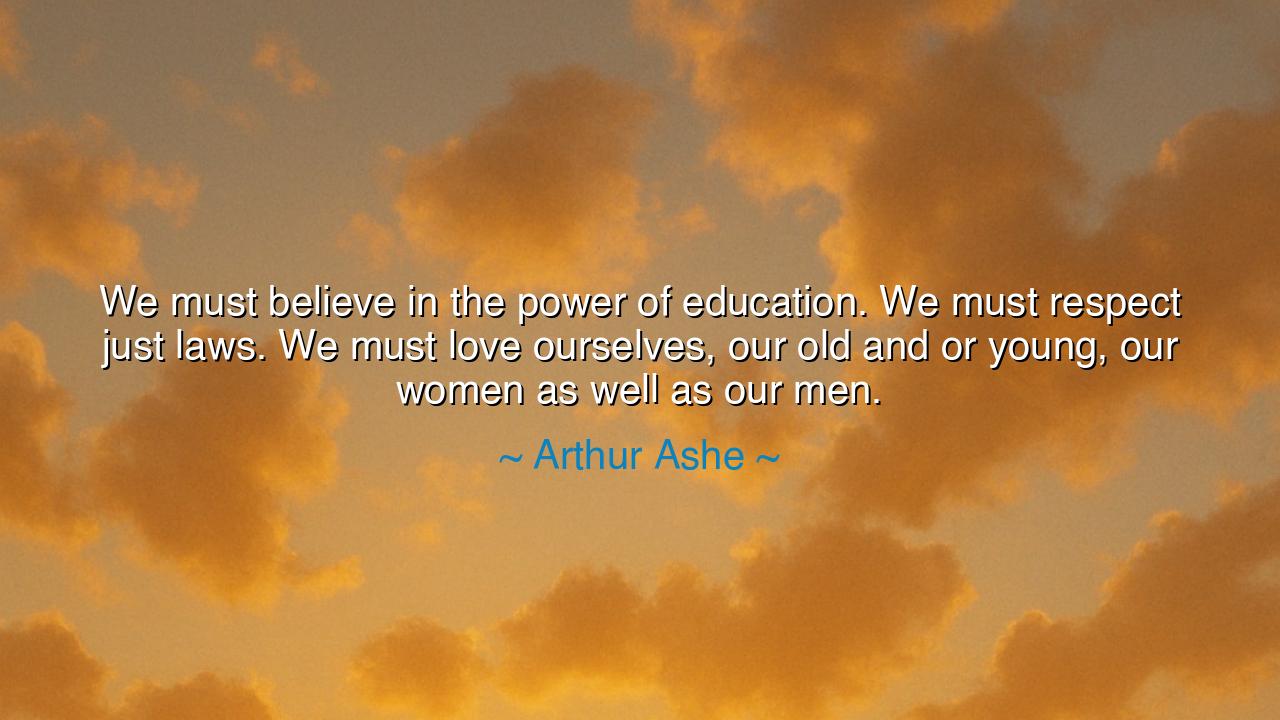
We must believe in the power of education. We must respect just
We must believe in the power of education. We must respect just laws. We must love ourselves, our old and or young, our women as well as our men.






Hear, O seekers of truth, the immortal words of Arthur Ashe, a man who battled not only on the courts of tennis but also on the fields of justice: “We must believe in the power of education. We must respect just laws. We must love ourselves, our old and our young, our women as well as our men.” In these words he sets forth a creed, a trinity of principles by which societies may flourish: the pursuit of knowledge, the honoring of justice, and the embrace of love that knows no division.
First, he speaks of the power of education. Ashe, a Black man who rose to greatness in a sport dominated by wealth and whiteness, knew that knowledge was not a luxury, but a weapon against oppression and ignorance. For without learning, the mind remains shackled even when the body is free. To believe in education is to believe in the possibility of transformation—that a child born into hardship may rise into greatness, that a people long oppressed may lift themselves by wisdom into dignity.
Next, he speaks of just laws. Ashe did not demand blind obedience to all laws, for history has given us cruel statutes that upheld slavery, segregation, and exploitation. Instead, he calls us to honor only the just, those laws rooted in fairness, equality, and truth. The respect for justice must be the compass of any society. Where laws are unjust, they must be challenged; where they are fair, they must be upheld with reverence. In this balance lies the health of nations.
And finally, he speaks of love—love of self, love of the old and the young, love of women as well as men. Here Ashe rises into the highest wisdom, for knowledge and justice alone cannot sustain a people without love. A society that forgets its elders, that neglects its youth, that honors one gender above another, is a society already broken. Love is the binding thread that makes justice warm and education human. Without it, even the greatest systems crumble into cold machinery.
History gives us a reflection of Ashe’s creed. Think of Nelson Mandela, who, like Ashe, combined the love of justice, the power of education, and the embrace of all people. Mandela studied law, fought against unjust apartheid statutes, and preached reconciliation instead of vengeance. His leadership healed a broken nation not by power alone, but by these very principles: learning, justice, and love. Ashe’s words echo Mandela’s life, proving them not mere ideals, but living forces that can transform nations.
Yet Ashe also knew suffering. He faced racism, he faced the stigma of illness, and still he carried dignity. His creed was not formed in ease, but in struggle. This gives weight to his words, for they were tested by fire. He reminds us that to respect ourselves and each other is not weakness but strength, that to love broadly is not naïve but revolutionary, and that to uphold justice is not convenient but necessary.
Therefore, O children of tomorrow, take this lesson: build your lives upon the pillars Ashe named. Pursue education, not only for wealth, but for wisdom. Honor laws only where they are just, and labor to make them more so. And above all, practice love that knows no boundary—between generations, between sexes, between races. Let your love guide your justice, and let your justice guard your learning. In this trinity you will find the way to both personal and collective greatness.
The final word is this: as Arthur Ashe has spoken, so must we remember. A society without education is blind; a society without just laws is corrupt; a society without love is barren. But together—knowledge, justice, and love—these three form the foundation of a great and noble life. Let us live by them, and in so doing, honor the legacy of those who lived and died to pass them on.






AAdministratorAdministrator
Welcome, honored guests. Please leave a comment, we will respond soon